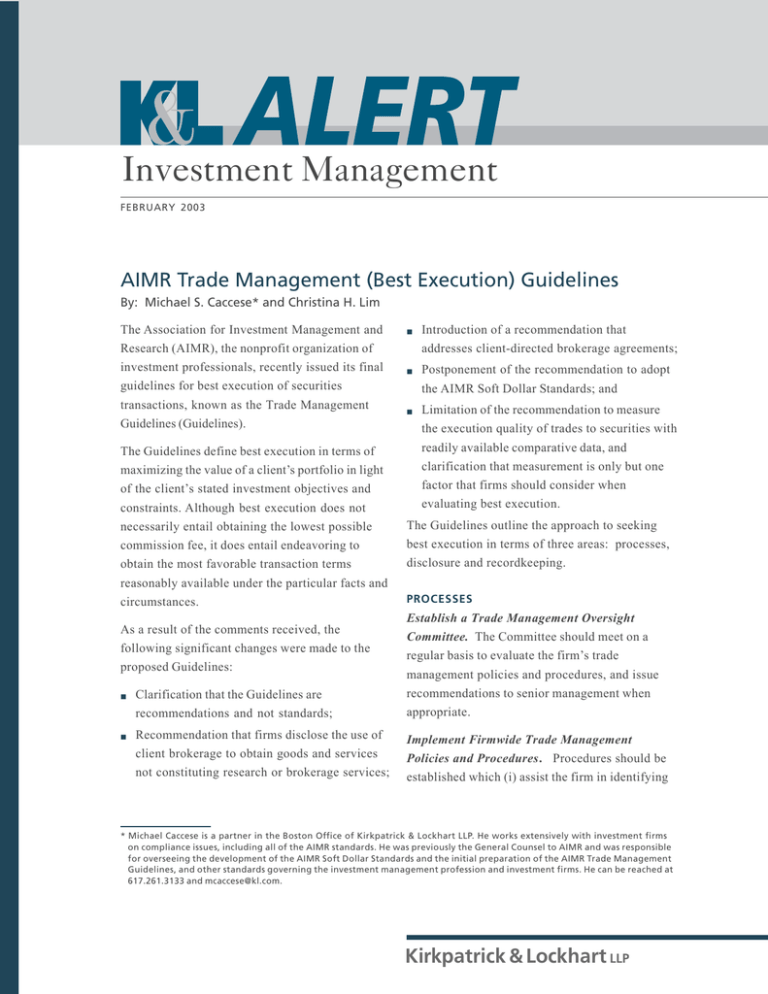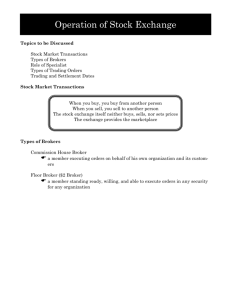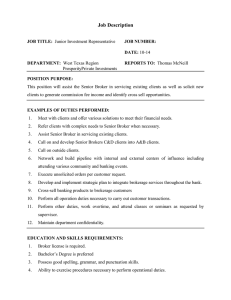
Investment Management
FEBRUARY 2003
AIMR Trade Management (Best Execution) Guidelines
By: Michael S. Caccese* and Christina H. Lim
The Association for Investment Management and
Research (AIMR), the nonprofit organization of
investment professionals, recently issued its final
guidelines for best execution of securities
transactions, known as the Trade Management
Guidelines (Guidelines).
The Guidelines define best execution in terms of
maximizing the value of a client’s portfolio in light
of the client’s stated investment objectives and
constraints. Although best execution does not
necessarily entail obtaining the lowest possible
commission fee, it does entail endeavoring to
obtain the most favorable transaction terms
reasonably available under the particular facts and
circumstances.
■
■
■
Introduction of a recommendation that
addresses client-directed brokerage agreements;
Postponement of the recommendation to adopt
the AIMR Soft Dollar Standards; and
Limitation of the recommendation to measure
the execution quality of trades to securities with
readily available comparative data, and
clarification that measurement is only but one
factor that firms should consider when
evaluating best execution.
The Guidelines outline the approach to seeking
best execution in terms of three areas: processes,
disclosure and recordkeeping.
PROCESSES
Clarification that the Guidelines are
recommendations and not standards;
Establish a Trade Management Oversight
Committee. The Committee should meet on a
regular basis to evaluate the firm’s trade
management policies and procedures, and issue
recommendations to senior management when
appropriate.
Recommendation that firms disclose the use of
client brokerage to obtain goods and services
not constituting research or brokerage services;
Implement Firmwide Trade Management
Policies and Procedures. Procedures should be
established which (i) assist the firm in identifying
As a result of the comments received, the
following significant changes were made to the
proposed Guidelines:
■
■
* Michael Caccese is a partner in the Boston Office of Kirkpatrick & Lockhart LLP. He works extensively with investment firms
on compliance issues, including all of the AIMR standards. He was previously the General Counsel to AIMR and was responsible
for overseeing the development of the AIMR Soft Dollar Standards and the initial preparation of the AIMR Trade Management
Guidelines, and other standards governing the investment management profession and investment firms. He can be reached at
617.261.3133 and mcaccese@kl.com.
Kirkpatrick & Lockhart LLP
actual and potential conflicts of interests resulting
from trading activities; (ii) require the disclosure of
such conflicts to clients; and (iii) assist in a regular
quality of service review of selected brokers. As a
result of several objections during the comment
period, the recommendation in the proposed
Guidelines to adopt AIMR Soft Dollar Standards
has been postponed until further review and
possible revision by the AIMR Standards of
Practice Council.
Establish Policies and Procedures Addressing
Client-Directed Brokerage Arrangements.
Policies and procedures addressing directed
brokerage agreements should be established, such
as those found in Appendix A of the AIMR Soft
Dollar Standards. The AIMR Soft Dollar Standards
may be found at http://www.aimr.org/pdf/
softdollars.pdf.
Implement a Trade Evaluation Process.
Processes should be established, using either
internal or external resources, to analyze trading
costs and execution trends of trades with readily
available comparative execution data. The process
should be consistently applied and should
consider client needs and unique firm
circumstances, overall market conditions, and
trading venues. Information should be analyzed:
(i) from period to period; (ii) against appropriate
objectives and benchmarks; and (iii) by broker,
trading venues and methods.
Implement Compliance Procedures to Ensure
Employee Adherence. The trading policies and
procedures should be distributed and taught to all
employees, to the extent appropriate.
Create Broker Selection Guidelines/ Approved
Brokers List. Brokers should be selected
according to various characteristics that may
assist the firm in meeting its client trading needs,
including:
■
Trade efficiency: the ability to minimize total
trading costs including maintaining adequate
capital, responding during volatile market
periods, and minimizing incomplete trades.
■
■
■
■
Level of trading expertise: ability to obtain
liquidity, trade completion, unique trading
strategies, quick trade execution, ability to
maintain the anonymity of an investment
manager, execution and settlement of difficult
trades, satisfaction of trading needs, ability to
maximize opportunities for price improvement,
methods of tracking and correcting trade errors
and engaging in after-hours and cross-border
trading.
Infrastructure: commitment to technology and
a quality trading system;
Other characteristics: suggestions that
improve the quality of trade executions,
proprietary or third-party research, access to
research analysts, broker staff and company
insiders.
Special transaction services: step-outs, wrap
programs, custody services, directed brokerage
and soft dollar arrangements, underwriting
syndicate participation and access to IPO
shares.
Firms should also consider the broker’s financial
condition and explore alternative trading options
while considering technology developments and
market changes that assist the firm in achieving
higher quality execution. In the process of
developing an approved broker list which takes the
foregoing characteristics into consideration,
procedures for using a non-approved broker
should also be established where the
determination has been made that doing so is in
the client’s best interest.
Analyze Brokerage Commission Trends and
Compare Brokerage Commission Forecasts with
Actual Brokerage Commission Paid. Firms
should make projections on annual trading activity
and broker compensation on the approved broker
list and periodically compare commission forecasts
to actual flows. Variations should be evaluated to
determine whether there are greater opportunities
to acquire more trading value or whether revisions
to the projections are necessary.
Establish Controls to Monitor and Evaluate
Broker Performance and Execution Quality.
Firms should review: (i) quarterly broker trading
reports; (ii) feedback from firm investment
personnel having substantive contact with the
broker; and (iii) information gathered through the
Trade Evaluation Process.
DISCLOSURES
Firms are encouraged to make, on a regular basis,
clear, accurate and current disclosures on trade
management practices as well as potential and
actual conflicts to current and prospective clients.
The particular disclosure recommendations that
AIMR suggests be made include:
Disclose Broker Selection Practices. The
disclosure should describe information considered
in the trade management process, including a list
of factors used in the broker selection process and
how the firm handles trade allocation.
Disclose Actual and Potential Conflicts of
Interest. Actual or potential conflicts that warrant
disclosure may include:
■
Step-outs;
■
Trade allocation and aggregation policies;
■
■
■
■
Research or other services obtained through
soft dollar arrangements;
■
■
Use of client brokerage to pay for client referrals
or other arrangements promoting the firm’s
business and the distribution of investment
company shares that the firm manages; and
Use of client brokerage to acquire goods or
services that do not constitute research or
brokerage services.
RECORD KEEPING
Firms should maintain accurate and complete
trading records which document: (i) the broker
selection process; (ii) broker performance on an
aggregate basis; (iii) post-trade analysis of
execution quality; (iv) conflicts of interest; (v)
committee materials; (vi) brokerage commissions;
(vii) soft dollar services; and (viii) client
agreements.
CONCLUSION
The Guidelines are recommendations of practices
and procedures to assist a firm in seeking best
execution for its clients. Although the Guidelines
are not standards, firms are encouraged to adopt
as many guidelines as are appropriate to their
particular circumstances. If a firm finds it
impracticable to adopt a particular
recommendation, AIMR suggests that the firm
make alternative arrangements that carry the same
objective. Compliance with the Guidelines will
assist firms in complying with their fiduciary duty
to “seek to achieve best execution” when
managing their client assets.
Affiliated broker usage on an agency or
principal basis;
Material business relationships with market
makers or market centers;
Directed brokerage arrangements;
®
Kirkpatrick & Lockhart LLP
Challenge us.®
BOSTON
■
DALLAS
■
HARRISBURG
■
LOS ANGELES
■
MIAMI
■
NEWARK
■
NEW YORK
■
PITTSBURGH
■
SAN FRANCISCO
■
WASHINGTON
.........................................................................................................................................................
This publication/newsletter is for informational purposes and does not contain or convey legal advice. The information herein
should not be used or relied upon in regard to any particular facts or circumstances without first consulting with a lawyer.
© 2003 KIRKPATRICK & LOCKHART LLP. ALL RIGHTS RESERVED.
Kirkpatrick & Lockhart LLP maintains one of the leading investment management practices in the United
States, with over 60 lawyers devoting all or a substantial portion of their practice to this area. According to
the April 2002 American Lawyer, K&L is a mutual funds “powerhouse” that represents more of the largest 25
investment company complexes and their affiliates than any other law firm.
We represent mutual funds, insurance companies, broker-dealers, investment advisers, retirement plans, banks
and trust companies, private funds, offshore funds and other financial institutions. We also regularly
represent mutual fund distributors, independent directors of investment companies, retirement plans and
service providers to the investment management industry. In addition, we frequently serve as outside counsel
to industry associations on a variety of projects, including legislative and policy matters.
We work with clients in connection with the full range of investment company industry products and
activities, including all types of open-end and closed-end investment companies, funds of hedge funds,
variable insurance products, private and offshore investment funds and unit investment trusts. Our practice
involves all aspects of the investment company business: from organizing and registering open-end and
closed-end funds, both as series and individual portfolios, to providing ongoing advice and representation to
the funds and their advisers, directors and distributors.
We invite you to contact one of the members of our investment management practice, listed below, for
additional assistance. You may also visit our website at www.kl.com for more information, or send general
inquiries via email to investmentmanagement@kl.com.
BOSTON
Michael S. Caccese
Philip J. Fina
Mark P. Goshko
Thomas Hickey III
Nicholas Hodge
617.261.3133
617.261.3156
617.261.3163
617.261.3208
617.261.3210
mcaccese@kl.com
pfina@kl.com
mgoshko@kl.com
thickey@kl.com
nhodge@kl.com
LOS ANGELES
William P. Wade
310.552.5071
wwade@kl.com
NEW YORK
Beth R. Kramer
Richard D. Marshall
Robert M. McLaughlin
Loren Schechter
212.536.4024
212.536.3941
212.536.3924
212.536.4008
bkramer@kl.com
rmarshall@kl.com
rmclaughlin@kl.com
lschechter@kl.com
SAN FRANCISCO
Eilleen M. Clavere
David Mishel
Mark D. Perlow
Richard M. Phillips
415.249.1047
415.249.1015
415.249.1070
415.249.1010
eclavere@kl.com
dmishel@kl.com
mperlow@kl.com
rphillips@kl.com
WASHINGTON
Clifford J. Alexander
Diane E. Ambler
Catherine S. Bardsley
Arthur J. Brown
Arthur C. Delibert
Robert C. Hacker
Benjamin J. Haskin
Kathy Kresch Ingber
Rebecca H. Laird
Thomas M. Leahey
Cary J. Meer
R. Charles Miller
Dean E. Miller
R. Darrell Mounts
C. Dirk Peterson
Alan C. Porter
Theodore L. Press
Robert H. Rosenblum
William A. Schmidt
Lynn A. Schweinfurth
Donald W. Smith
Robert A. Wittie
Robert J. Zutz
202.778.9068
202.778.9886
202.778.9289
202.778.9046
202.778.9042
202.778.9016
202.778.9369
202.778.9015
202.778.9038
202.778.9082
202.778.9107
202.778.9372
202.778.9371
202.778.9298
202.778.9324
202.778.9186
202.778.9025
202.778.9464
202.778.9373
202.778.9876
202.778.9079
202.778.9066
202.778.9059
calexander@kl.com
dambler@kl.com
cbardsley@kl.com
abrown@kl.com
adelibert@kl.com
rhacker@kl.com
bhaskin@kl.com
kingber@kl.com
rlaird@kl.com
tleahey@kl.com
cmeer@kl.com
cmiller@kl.com
dmiller@kl.com
dmounts@kl.com
dpeterson@kl.com
aporter@kl.com
tpress@kl.com
rrosenblum@kl.com
william.schmidt@kl.com
lschweinfurth@kl.com
dsmith@kl.com
rwittie@kl.com
rzutz@kl.com
®
Kirkpatrick & Lockhart LLP
Challenge us. ®



